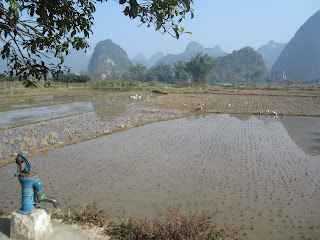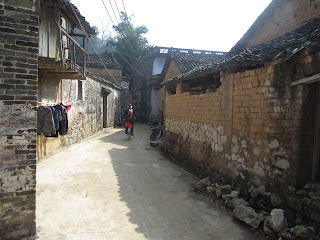 |
| quiet Yulong River |
Biking or hiking around the pastoral countryside south of Guilin, Guangxi province, it's easy to "ooohhh" and "aaahhh" at the scenery, feeling more and more relaxed by the mile. The massive karst limestone mountains, pillars, and valleys create an imposing and breathtaking landscape, attracting many tourists.
John and I went south of Guilin and stayed about 5 kilometers outside of Yangshuo, in Aishanmen village at the surprisingly western Giggling Tree Guesthouse. The cooler weather, winter off-season combined with village life gave us near total quiet and solitude to the point where we would practically run-over chickens in the road.
These days also gave me another view into China and a lifestyle much tougher than I imagined possible in the 21st century, and it doesn't take much to look beyond the surface. Everywhere we walked and biked we saw people, many quite old, working really, really hard at obtaining the most meager existence. People ride bikes or walk with impossibly heavy and huge loads. Most agriculture is done by manual labor, with or without a water buffalo. Most houses get water from hand-pump wells. Evidence of open sewage is unavoidable. Clothes washing is done by hand at the wells or in creeks and rivers. Charcoal is sold at markets for heating and cooking. Small charcoal burning pans provide some heat for houses. Various construction projects take manual labor and hand tools, like mixing and carrying concrete. At every backbreaking effort we saw, we'd point out to each other, "look!" or "did you see that?"
I read in the
Rough Guide to Southwest China that in 1970s the 3 big buys that a Chinese family could aspire to were a bike, a watch, and a radio, then in the 1980s it was a washing machine, a TV, and a refrigerator, now today urban Chinese can aspire to the same consumer goods as developed western countries. That's not what we saw in this rural area. The
RG goes on to say that "more than half of China's citizens live on less than a dollar a day," and that is the gritty lifestyle we saw amid this amazing landscape.
Here are a few highlight days.
Bike Ride Day:
A loop from the Giggling Tree Guesthouse along the Yulong River to Baisha Town and back on rural roads, dirt roads, and dirt trails.
 |
| near the Giggling Tree guesthouse |
 |
| rice field |
 |
| village on the Yulong River |
 |
| John checks the picture map from the hostel |
 |
| ancient arched stone bridge |
 |
| one of the many villages |
 |
| water buffalo farming |
Hike Day:
Take bus from Yangshuo to Xingping. Xingping is a great place to hangout and use as a base, better than Yangshuo.
Walk along the Li River, a mix of paved road, dirt road, paved trail, and dirt trail. 3 river crossings (10 yuan pp), 4-5 hour walk time. (This direction avoids the start fee Yangdi.)
Take bus from Yangdi back to Yangshuo. There's nothing to do in Yangdi.
 |
| Xingping, old town |
 |
| the primary form of transportation |
 |
| washing clothes in the river |
 |
| view up river from Xingping |
 |
| many orange orchards |
 |
| carefully tended vegetables grow everywhere |
 |
on the right, notice the faux gray brick?
it's a thin layer of material applied over the old, worn bricks.
I guess to give the old village a new, artificial look |
 |
| roof tiles |
 |
| well for household water |
 |
| yet another Chinese slogan |
 |
"Hello! Bamboo?" means do you want a ride across the river,
or down the river.
Never mind that most rafts are PCV pipe now. |
End of hike, I
had to bargain for the last river crossing.
The asking price: more than double.
Another day: a bike ride to, and hike up, Moon Hill. But it was cloudy, so no wonderful landscape views.
 |
| Moon Hill, where's the moon? the sun? |





























Beautiful scenery, thanks for sharing. Perfect way to spend time together, hiking and biking. You are seeing place most people will never see in China.
ReplyDelete